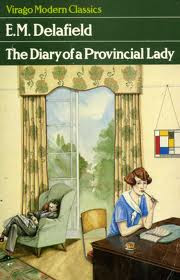 Anne Fadiman wrote in Ex Libris that every bibliophile has a shelf (or shelves) of books that is somewhat off-kilter from the rest of their taste. Mine might be my theology shelf, or my theatrical history shelf, but I think the books (few as they are) most likely to surprise the casual observer would be those on neurology.
Anne Fadiman wrote in Ex Libris that every bibliophile has a shelf (or shelves) of books that is somewhat off-kilter from the rest of their taste. Mine might be my theology shelf, or my theatrical history shelf, but I think the books (few as they are) most likely to surprise the casual observer would be those on neurology.When I told my Dad I'd bought and read Hallucinations by Oliver Sacks (after he'd spotted a review and told me about it), he asked "But will you be writing about it on your blog?" "Of course," thought I - it hadn't crossed my mind that I wouldn't. But I pondered on it, and thought - would blog-readers used to my love for 1930s novels about spinsters drinking tea also want to read about phantom limbs and Delirium Tremens?
Believe me, you will. I have almost zero interest in science in all its many and varied forms. I stopped studying it when I was 16 (except for maths) and found it all very dull before that point. (Apologies, science-lovers.) Biology was far and away my least favourite subject. And yet Hallucinations is absolutely brilliant, as fascinating and readable as his popular work The Man Who Mistook His Wife For A Hat. A predilection for scientific books is definitely not a prerequisite. Sacks is just as much a storyteller as a scientist.
Before starting Hallucinations, I thought they were mostly terrifying, felt real, and came chiefly with a fever or drug abuse. While hallucinations can be all these things, I was surprised to learn how often they are benign (even amusing or comforting) and easily recognised as fake. Strangest still, I hadn't realised that (under Sacks' definitions) I had experienced hallucinations myself.
That's not quite true - I knew I'd had them when I had an extremely high temperature during flu, but I hadn't known that what I'd had repeatedly as a child were hypnagogic hallucinations - those that people get just before going to sleep. Aged about 5, I often used to see chains of bright lights and shapes (and, Mum remembered but I did not, faces) in front of me - whether my eyes were open or closed - at bedtime. It turns out hypnagogic hallucinations are very common, and (Sacks writes) rarely unnerving for the hallucinator. Well, Dr. Sacks, aged five I found them incredibly frightening, and usually ran to mother!
There are so many types of hallucinations that Sacks has witnessed in decades of being a neurologist, encountering hundreds of people and hearing about thousands from his colleagues. This book just includes the ones who gave him permission. It would necessitate typing out the whole book to tell you all the illustrations he gives, but they range from fascinating accounts of Charles Bonnet Syndrome (basically seeing hallucinations, often highly detailed, for long or short periods) to hallucinated smells, sounds, and even a chapter on hallucinating doppelgangers.
Almost all of these hallucinations act alongside lives which are lived otherwise normally, and do not suggest any terrible neurological condition. It is somewhat chilling that Sacks recounts a study which revealed that 12 volunteers, with otherwise 'normal' mental health histories, were asked to tell doctors they were hearing voices - and 11 were diagnosed with schizophrenia. Sacks is keen to point out how many patients with hallucinations, even when voices, are not suffering from schizophrenia or any other sort of mental illness. He is deeply interested in how people manage their lives when seeing hallucinations at any hour of the day, and offers up humble praise to those who take it in their stride.
This is what makes Sacks so special. A few of the blurb reviews describe him as 'humane', which I suppose he is - but the word feels a little dispassionate. Sacks, on the other hand, is fundamentally compassionate. He never treats or describes people as case studies. The accounts he gives are not scientific outlines, interested only in neurological details, but mini-biographies filled with human detail, humour, and respect. Here's an example of all three factors combining:
Gertie C. had a half-controlled hallucinosis for decades before she started on L-dopa - bucolic hallucinations of lying in a sunlit meadow or floating in a creek near her childhood home. This changed when she was given L-dopa and her hallucinations assumed a social and sometimes sexual character. When she told me about this, she added, anxiously, "You surely wouldn't forbid a friendly hallucination to a frustrated old lady like me!" I replied that if her hallucinations had a pleasant and controllable character, they seemed rather a good idea under the circumstances. After this, the paranoid quality dropped away, and her hallucinatory encounters became purely amicable and amorous. She developed a humour and tact and control, never allowing herself a hallucination before eight in the evening and keeping its duration to thirty or forty minutes at most. If her relatives stayed too late, she would explain firmly but pleasantly that she was expecting "a gentleman visitor from out of town" in a few minutes' time, and she felt he might take it amiss if he was kept waiting outside. She now receives love, attention, and invisible presents from a hallucinatory gentleman who visits faithfully each evening.And with this respect and kindness definitely comes a sense of humour - the sort of humour exemplified by many of the people he met. This detail, in a footnote, was wonderful:
Robert Teunisse told me how one of his patients, seeing a man hovering outside his nineteenth-floor apartment, assumed this was another one of his hallucinations. When the man waved at him, he did not wave back. The "hallucination" turned out to be his window washer, considerably miffed at not having his friendly wave returned.Although Sacks does not compromise his scientific standing, Hallucinations is definitely (as demonstrated by me) a book which is accessible to the layman. In the whole book, there was only one sentence which completely baffled me...
When his patient died, a year later, an autopsy revealed a large midbrain infarction involving (among other structures) the cerebral peduncles (hence his coinage of the term "penduncular hallucinations").I'll take your word for it, Oliver.
But, that excerpt aside, Hallucinations was more of a page-turner than most detective novels, paid closer attention to the human details of everyday life than much domestic fiction, and certainly left me with more to think about than many books I read. I hope I've done enough to convince you that, even if you think you won't be interested, you probably would be.
I have wondered whether my interest in neurology might, in fact, just be an appreciation of Oliver Sacks. I've started other books in the field and not finished them, though I will go back to one on synaesthesia that I recently began. Perhaps no other author combines Sacks' talents as scientist and storyteller... but I'm happy to be proven wrong, if anyone has any suggestions?
For now, though, I'm going to have to hunt out my copy of Sacks' Awakenings...



























